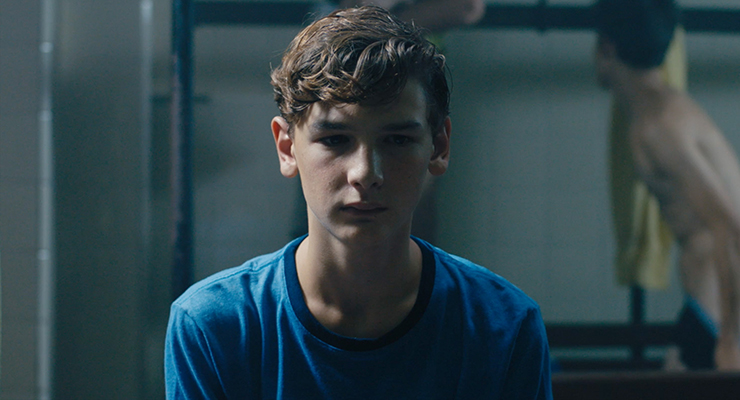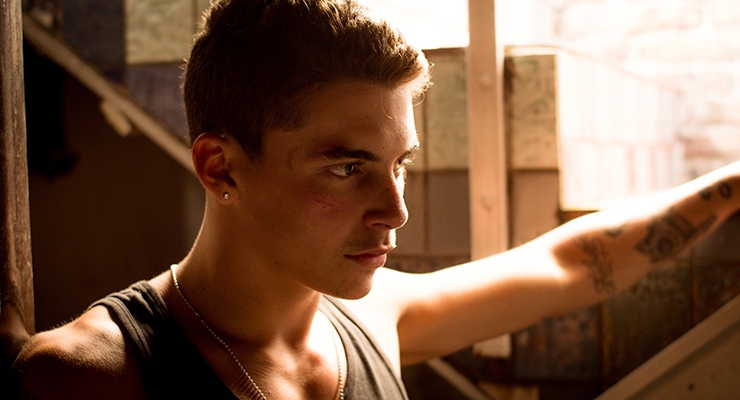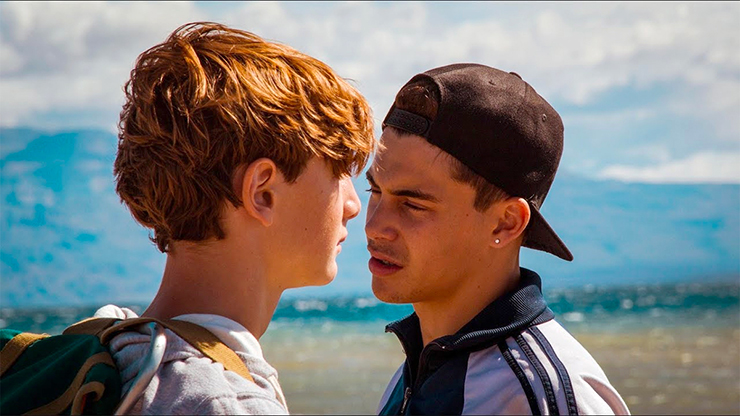
Lautaro Rodríguez, Angelo Mutti Spinetta.
But here's the thing: One's sexual orientation, while very much an important part in our journey of self-discovery, forms only a fraction of who we are. What about the plethora of issues that take up the rest of our waking hours? This is something writer-director Martín Deus understands deep in his bones. His debut feature “My Best Friend” (“Mi mejor amigo”) has as its protagonist a quiet teen who's not exactly comfortable with the realization that he likes other boys, much less anyone else knowing about it, but he's got other, more pressing matters to manage. And this approach makes all the difference in making potentially stale material feel fresh and resonant.

Angelo Mutti Spinetta.
The coming-of-age drama, which had its U.S. premiere at Miami's OUTshine Film Festival back in April, was finally released commercially in its native Argentina at the end of August. This Thursday, Sept. 20, South Florida audiences who missed it this spring will have another chance to catch this tough-love portrait of adolescence. It is well worth seeking out.
The shy teen at the heart of “My Best Friend” is Lorenzo (Angelo Mutti Spinetta), who lives with his parents, Camila and Andrés, and his brother Luky (Benicio Mutti Spinetta, Angelo's real-life sibling) in remote Patagonia. What initially comes across about this close-knit clan is their banter. Mom (Mariana Anghileri) and Dad (Guillermo Pfening) both work, and they instill in their children a sense of independence, informed by parental restrictions. The interaction feels organic, lived in, establishing from the outset that Lorenzo's loved ones are not one-note types.
Lorenzo applies himself at school. The 16-year-old does well, but Deus does away with the nonsense that it all comes easily just because he's smart. He works hard, but he doesn't play hard. Actually, sports aren't this bookworm's thing. Okay, so he feels a tingle whenever he sees boys changing at P.E. class, but at this point it's a nuisance he feels compelled to keep hidden.
And then Caíto comes into his life to disrupt everything. Andrés has agreed to take in the older boy, who is the son of a close friend who has fallen on hard times. Camila, who has a mother's built-in radar for sniffing out a dubious proposition, is skeptical about opening her home to someone who, her husband hints, attracts trouble like a magnet. And Lorenzo? He's not crazy at the prospect of sharing his personal space with this dude he barely remembers from childhood.

Lautaro Rodríguez.
But then Caíto (Lautaro Rodríguez), moves in, and Lorenzo, much to his surprise, finds himself forming a connection with this boy who couldn't be more different from him. Alpha to his beta, Caíto is, at least initially, even more shy than our protagonist, but he's also a sports enthusiast, especially mountain bikes. Effortlessly masculine. Confident. And, oh yeah, really handsome.
But hold your horses. Deus doesn't take the usual route of conveying sexual tension and revolving his narrative around whether the new arrival feels attracted to his roommate. The yin-yang contrast between the two boys fosters a deeper connection, but the filmmaker highlights the platonic elements of their friendship.
It's a bond that comes in handy when Caíto gets in trouble with Lorenzo's parents. Pretty Boy, you see, has a problem with authority, and let's just say things like curfew and following house rules go in one ear and out the other. Camila and Andrés grapple with the possibility of kicking out the disobedient scoundrel.
So what does Lorenzo do? He steps up, volunteers to supervise the wayward house guest. Camila (reluctantly) agrees, but stresses that Caíto conduct will be his responsibility. This, and not coping with concealed sexual longings, is what “My Best Friend” is ultimately about: taking responsibility for one's actions, even if it means risking estrangement from loved ones. What unfolds after the teen takes on Caíto as his personal project is best left for you to discover. Suffice it to say, Deus' tightly constructed screenplay and richly observed direction confounds genre expectations at almost every turn. There's a camping trip later in the film that allows cinematographer Sebastián Gallo a chance to show off Patagonia's natural beauty. This sequence is reminiscent of the way Luca Guadagnino turned the rural landscapes of northern Italy into a secondary character in “Call Me by Your Name.” But the will-they-or-won't-they tension is here replaced with a simmering clash of worldviews.

Angelo Mutti Spinetta, Lautaro Rodríguez.
But “My Best Friend” tells a different kind of coming-of-age story than Guadagnino's film. Even when Deus eventually deals with Lorenzo's sexuality, it bubbles to the surface in organic fashion, such as an unexpected heart-to-heart between the boy and his mother. Anghileri slays the scene, turning the frank exchange into an opportunity to vent her character's own frustration with living in what she describes as the middle of nowhere.
The movie, though, belongs to Angelo Mutti Spinetta. In this reviewer's case, it wasn't until long after the movie was over that the hushed strength of his performance fully registered. He's not much for showing off, and neither is “My Best Friend,” a moving chronicle of a tender but fraught friendship that never strikes a false note. It is all the more powerful for eschewing feel-good concepts about the way people come into our lives and how they're capable of changing us. It goes “off message” in all kind of refreshing ways.
“My Best Friend” screens Thursday, Sept. 20, at 7 p.m. at the Classic Gateway Theatre. It's OUTshine's last 954 GLOW screening before this year's Fort Lauderdale fest starts Oct. 18. Breaking Glass Pictures will make the film available on streaming platforms Nov. 13.




